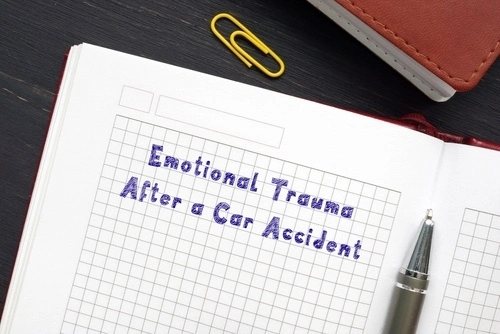If you’ve been in a car accident in Atlanta, you may struggle with anxiety and depression as well as physical injuries. Emotional trauma is a real and valid concern for many car accident victims. People often ask our attorneys, “Can you sue for emotional distress in Georgia?”
The short answer is yes. However, car accident victims generally must suffer physical injuries to sue for emotional distress. We’ll explain the process of suing for emotional distress in more detail below.
An experienced Atlanta car accident lawyer can help you pursue the compensation you deserve. If you or a loved one has suffered emotional distress as a result of a car accident, don’t hesitate to reach out to GMV Law Group. We are here to fight for your rights.
When Can You Sue for Emotional Distress in Georgia?
Georgia follows a legal doctrine known as the impact rule. This means that you cannot typically sue for emotional distress after a car accident unless you have suffered a physical injury. Under Georgia law, you must prove that the emotional distress you are experiencing is linked to the physical injuries you sustained during the crash.
For example, if you were involved in a car accident but did not suffer any physical injury, you might have a hard time winning an emotional distress claim. However, if you suffered injuries such as whiplash, broken bones, or other physical harm, you might be able to file a claim for emotional distress as well.
Proving Emotional Distress After a Car Accident
Proving emotional distress in a car accident case can be challenging, but it is possible with the right evidence. Emotional distress refers to a range of psychological symptoms, such as anxiety, depression, post-traumatic stress disorder (PTSD), and fear, all of which can significantly impact your life.
You must prove several key elements when suing for emotional distress in a Georgia car accident case:
- The other driver was negligent.
- The other driver was responsible for the accident.
- Your emotional distress is directly related to the car accident.
- Your emotional trauma is significant enough to warrant compensation.
Medical documentation and testimony can help establish the severity of your emotional suffering.
Medical Records
If you sought medical care for anxiety, depression, or other psychological conditions following the accident, those records can help substantiate your claim. A doctor or therapist’s testimony stating that your emotional distress was caused by the accident will strengthen your case.
Testimony from Friends and Family
Testimony from those close to you who witnessed changes in your behavior or emotional well-being after the accident can serve as supporting evidence. They may describe how your ability to function in daily life has been impaired, such as difficulties in maintaining relationships, work, or other aspects of your life.
Expert Witnesses
A psychologist, psychiatrist, or other mental health professional can testify about your emotional distress and its connection to the accident. These experts can provide an objective perspective and validate your claims.
Your Testimony
Your personal account of how the car accident has affected your emotional and mental well-being is also important. Describing your emotional pain and how it has impacted your quality of life can help convey the gravity of your distress to the court.
While proving emotional distress may not be as straightforward as physical injury claims, it is possible with the right combination of evidence. Working with an experienced Atlanta car accident lawyer is crucial for building a strong case.
Emotional Distress and Non-Economic Damages
Non-economic damages are compensation for an accident’s impact on your life, including emotional distress. In contrast, economic damages compensate for financial losses like medical bills, lost wages, and property damage.
Types of non-economic damages may include:
- Pain and Suffering: This covers the physical and emotional suffering, including pain from the accident and ongoing suffering from psychological trauma.
- Loss of Enjoyment of Life: If you can no longer participate in hobbies, socialize, or experience activities that once brought you joy, you can seek compensation for this loss.
- Mental Anguish: The emotional toll of a car accident, including anxiety, depression, and post-traumatic stress disorder (PTSD), can all be considered as mental anguish.
- Loss of Consortium: If your relationship with your spouse has been affected by your injuries and emotional trauma, you may be able to seek damages for loss of consortium.
Calculating non-economic damages can be challenging. Unlike medical bills or lost wages, there is no easy way to quantify emotional suffering. Various factors, such as the severity of your injuries, your recovery time, and how emotional suffering has affected your daily life, can all influence how much compensation you may receive.
A skilled Atlanta car accident lawyer will negotiate with the insurance company for a fair settlement. Your attorney will be ready to take your personal injury case to court if necessary.
The Deadline When Suing for Emotional Distress in Georgia
Under Georgia’s car accident statute of limitations, you generally have two years to file a personal injury lawsuit after a car crash. Missing the deadline can cause you to lose the right to seek compensation.
However, there are certain circumstances where the statute of limitations might be extended or tolled, such as if the victim was a minor at the time of the accident. Building a case takes time, and it’s important to act quickly while the evidence is fresh.
You should contact an experienced Atlanta car accident lawyer as soon as possible to understand your legal rights and ensure that you meet all necessary deadlines.
How GMV Law Group Can Help
If you’ve been involved in a car accident and are considering filing a lawsuit for emotional distress in Georgia, GMV Law Group is here to help. We understand the toll a crash can take on your physical and emotional well-being. We are committed to helping accident victims recover the maximum compensation.
Our experienced Atlanta accident lawyers will help you gather the evidence necessary to prove your emotional distress claim, whether through medical records, expert testimony, or other supporting materials. We will guide you through every step of the legal process and work tirelessly to negotiate a fair settlement or pursue litigation if necessary.
At GMV Law Group, we understand the challenges you are facing, and we are here to help you seek justice. Call 404-975-4878 or contact us online today to schedule a free consultation.





